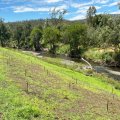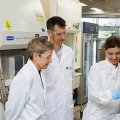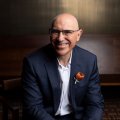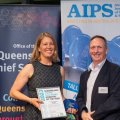XeroCoat Inc, the company commercialising anti-reflective technology research developed by Dr Michael Harvey and Professor Paul Meredith from The University of Queensland’s (UQ) School of Mathematics and Physics, has recently announced a number of global partnerships and investment plans to accelerate commercial access to its innovations.
The solar energy start-up established in 2005 by UQ’s main commercialisation company, UniQuest, has formed a strategic partnership with Hitachi High-Technologies Corporation, a subsidiary of Hitachi, Ltd.
The partnership will allow XeroCoat and Hitachi High-Technologies to pursue a leading share of the solar power generation market through the sale of anti-reflective coating equipment and materials to solar module and glass manufacturers.
The agreement includes a territorial rights investment from Hitachi (figure undisclosed) to distribute the anti-reflective coating systems and chemistry in Japan and China. XeroCoat's first production line was installed in China late last year and is currently in Factory Acceptance Testing.
Hitachi High-Technologies believes 50% of all solar modules are projected to have anti-reflection coatings by 2015. The Nomura Research Institute estimates the solar power market will deliver total power output of roughly 8,800 MW, representing a high annual growth rate of 19%. By 2015, market scale in terms of power output is expected to be around 21,000 MW.
The cost benefits and other advantages offered by anti-reflective coatings are expected to spur their rapid uptake. The proof supporting the coatings’ energy efficient properties continues to be developed at UQ as does the next generation of XeroCoat solar coating products.
In the US, XeroCoat has worked with Assembly & Test Worldwide Inc., an Ohio-based equipment automation specialist, to build its first plant. In 2009, XeroCoat also formed a partnership with Air Liquide Electronics US LP, whereby the industrial gases company produces the precision chemical delivery systems for XeroCoat's technology. A deal with a German company is also pending, made possible with a direct loan for breaking into new markets from the Export-Import Bank of the US.
Later this year XeroCoat will endeavour to raise US$5-$10 million in a Series C round of equity financing.
Dr Michael Harvey, XeroCoat’s Chief Technical Officer whose PhD research with Professor Paul Meredith at UQ led to the development of the technology, said the cost of solar power generation is relatively high compared to other power sources, since only about 20 percent of the collected solar energy can be converted into electricity.
“This constitutes a significant barrier to full-scale adoption of solar power, so we are now looking at ways to reduce the amount of light reflected by the protective glass on the surface of solar modules by applying an anti-reflective coating. This technique makes conversion to electricity more efficient by enabling greater transmission of sunlight,” Dr Harvey said.
XeroCoat has been described as “the most cost-effective watt on the solar module”. With the glass surface of solar modules typically reflecting more than 4% of incoming light, the XeroCoat anti-reflective coating offers solar module makers a potential 3% increase in peak power output and a 4% increase in energy produced on a kWhr basis.
XeroCoat’s turnkey coating system is simple, compact, environmentally friendly and energy efficient, making it compatible with existing manufacturing processes throughout the supply chain. The XeroCoat anti-reflective turnkey coating system has application to the entire range of solar energy technologies, including crystalline silicon and thin-film photovoltaics, concentrating photovoltaics, and solar thermal devices.
UniQuest’s Managing Director, David Henderson, said XeroCoat’s latest partnerships and investment plans demonstrate the growing reputation of Australian university research as a source of commercially valuable innovation.
“Taking a technology like this from the research lab to the rooves and windows of buildings all over the world requires a great commitment and investment of time, expertise and money,” Mr Henderson said.
“We congratulate XeroCoat’s president and CEO, Thomas Hood, on securing alliances with international companies like Hitachi so this Australian innovation can benefit from the efficiencies of scale and brand strength of global partners.
“We also hope the third round of equity financing is as encouraging as the first two, which raised about US$15 million from Australian and US investors.”
In July 2009 XeroCoat received a A$2 million Australian Government Climate Ready grant to develop another innovation – an anti-soling coating technology which, with the anti-reflective coating, aims to deliver more light to each solar module, increasing energy output and making solar energy even more affordable. The United States Department of Energy also granted the company US$2.96 million to develop a method for applying the anti-reflective coating directly onto assembled photovoltaic solar modules. These new developments are underpinned by an innovative Australia-California co-operative model whereby the main materials R&D is performed at the XeroCoat Brisbane Laboratories and the process development work at the main Redwood City site in Silicon Valley.
Media enquiries: UniQuest Leanne Wyvill +61 7 3365 4037, 0409 767 199 or l.wyvill@uniquest.com.au
XeroCoat, Inc. Beth McAllister +1-650-362-6306 or bmcallister@xerocoat.com
About UniQuest
Established by The University of Queensland in 1984, UniQuest is widely recognised as one of Australia’s largest and most successful university commercialisation groups, benchmarking in the top tier of technology transfer worldwide. It has created more than 60 companies, and since 2000 UniQuest and its start-ups have raised more than $340 million to take UQ technologies to market. Sales of products using UQ technology and licensed by UniQuest now exceed $5 billion per year. UniQuest also commercialises innovations developed at the University of Wollongong, University of Technology Sydney, James Cook University, University of Tasmania, the Mater Medical Research Institute and two ARC Centres of Excellence. As well, UniQuest can access thousands of researchers and experts and tailor a consulting or project R&D solution to meet the needs of industry and government. UniQuest is also a leading Australasian provider of international development assistance projects. Working with agencies such as AusAID, NZAID, the Asian Development Bank, and the World Bank, UniQuest has developed and implemented more than 400 projects in 46 countries throughout the Pacific, South-East Asia, the Indian sub-continent and Africa. For more information about UniQuest, please visit www.uniquest.com.au.
About XeroCoat
XeroCoat is a Silicon Valley company that designs and manufactures high-performing anti-reflective coating equipment and materials for solar energy modules. XeroCoat’s innovative technology delivers greater solar energy affordability today by decreasing manufacturing costs for solar module makers and increasing energy returns for solar system owners. Founded in Queensland, Australia and headquartered in Redwood City, California, XeroCoat has an international team of world-class optical materials and solar energy scientists and engineers who are focused on continuous innovation of coatings for the solar energy industry. For more information, visit www.xerocoat.com.










